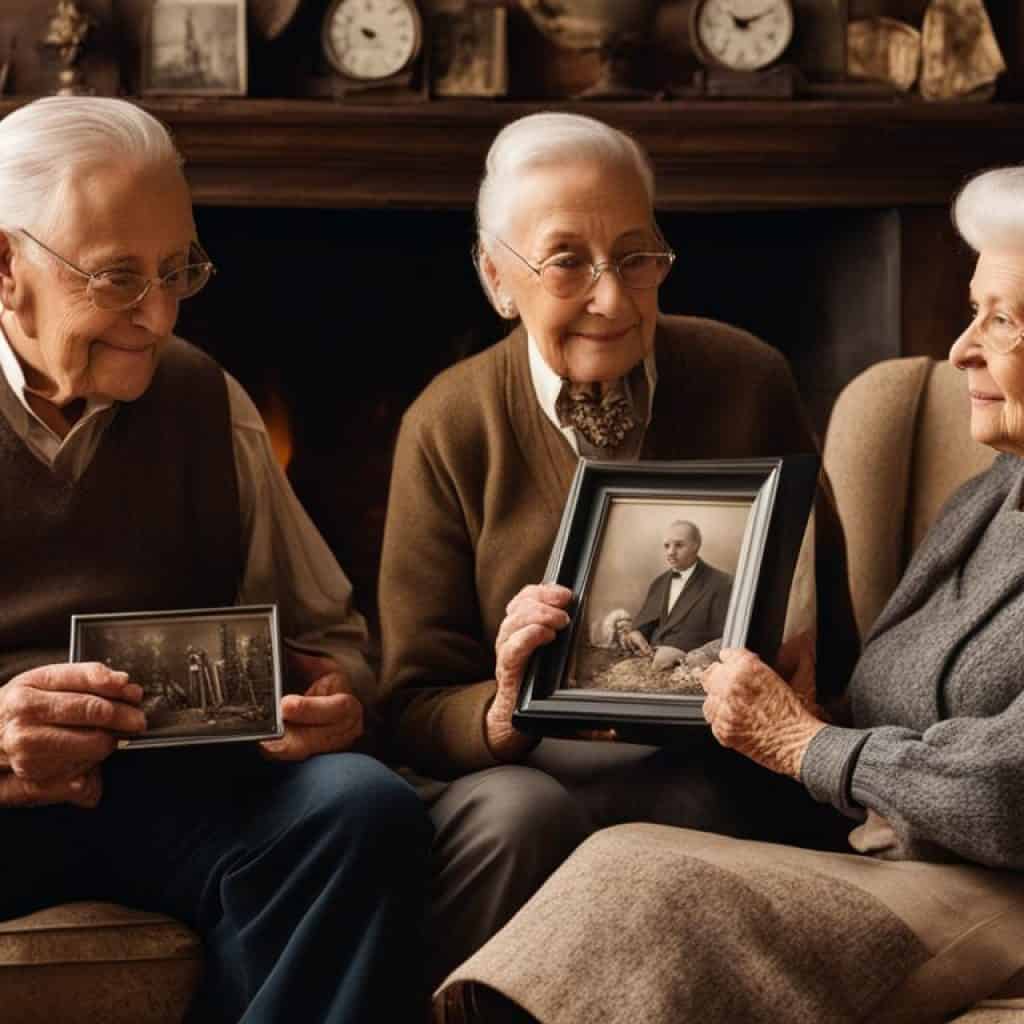In any relationship, there are qualities that are shared and others that differ. Age gap relationships have become increasingly common, raising questions about the impact of a significant age difference on a partnership. Is 6 years a big age gap? Let’s explore the dynamics of age gap relationships, the challenges they may face, and how love can transcend numbers.
Key Takeaways:
- An age gap in a relationship can bring both benefits and challenges.
- Factors such as emotional maturity, priorities, and concerns about the future can influence the success of an age gap relationship.
- Social stigma and power imbalances are common challenges faced by age gap couples.
- Research suggests that smaller age gaps of 1 to 3 years are considered ideal, but individual compatibility plays a more crucial role than the age difference.
- Love and compatibility go beyond numbers, allowing couples to build strong and fulfilling relationships regardless of the age gap.
Emotional Maturity in Age Gap Relationships
Age gaps, even small ones, can result in different levels of emotional maturity. When the age gap is significant, such as 10 to 15 years or more, life experiences can be vastly different. This difference in maturity can lead to one partner carrying a heavier emotional load in the relationship, potentially causing exhaustion and strain.
âThe emotional maturity disparity in age gap relationships can be a significant challenge. The partner who is older may have already gone through various life stages, while the younger partner may still be navigating important milestones. This difference in emotional maturity can create an imbalance in the relationship, where one partner may have to take on a larger emotional load. This can lead to exhaustion and strain on the relationship if not addressed and managed effectively.â
It’s important for both partners to acknowledge and understand the potential discrepancies in emotional maturity due to the age gap. Open communication, empathy, and active efforts to bridge the gap can help alleviate the emotional load and foster a healthier relationship.
In age gap relationships, the partner who is older may have already dealt with challenges such as career development, establishing financial stability, and possibly even starting a family. On the other hand, the younger partner may still be exploring their career path, building a foundation for their future, and considering important life decisions.
The emotional maturity difference necessitates a supportive environment where both partners can express their concerns, seek understanding, and find ways to accommodate each other’s needs. Through trust, patience, and compassion, the emotional load can be shared more equally, preventing relationship exhaustion and fostering a deeper connection.
| Challenges in Emotional Maturity | Strategies for Overcoming |
|---|---|
| Differences in life experiences and perspectives | Engage in active listening and empathetic communication to understand and respect each other’s point of view |
| Disparity in future goals and priorities | Engage in open discussions to align priorities and find common ground for a shared future |
| Managing family dynamics and expectations | Establish healthy boundaries and communicate openly with family members to reduce external pressure |
| Dealing with societal judgment and stigma | Develop a strong support system and surround yourselves with accepting and understanding individuals |
By proactively addressing the emotional maturity differences in age gap relationships, couples can foster a supportive and fulfilling dynamic. Navigating the emotional load together can strengthen the bond and ensure a healthier and more balanced partnership.
Priorities in Age Gap Relationships
In age gap relationships, priorities play a crucial role in determining long-term compatibility between partners. With a significant age difference, various factors, such as health, energy levels, life goals, and plans to start a family, can vary significantly. It is important for couples to have open discussions and align their priorities to ensure a harmonious and fulfilling relationship, irrespective of the age gap.
One of the primary challenges in age gap relationships is the difference in life stages. Partners may find themselves at different points in their careers, personal growth, and overall life experiences. For example, the older partner may have established their career and be financially stable, while the younger partner may still be focused on building their professional life. This difference in priorities and life stage can impact decision-making processes and expectations in the relationship.
Another aspect of priorities in age gap relationships revolves around starting a family. The desire to have children and the timeline for doing so can vary significantly between partners. The older partner may have already raised children from a previous relationship or may no longer be interested in having children, while the younger partner might have a strong desire to start a family. It is essential for couples to openly communicate and address these differences in order to find a common ground and make informed decisions about their future.
“The key to a successful age gap relationship lies in understanding and respecting each other’s priorities,” says relationship expert, Dr. Maya Johnson. “Couples need to have honest conversations about their life goals, career aspirations, and family plans. By doing so, they can identify areas of mutual compatibility and find ways to navigate any potential challenges that may arise.”
| Challenges in Age Gap Relationships | Priorities |
|---|---|
| Differences in life stages | Health |
| Expectations | Energy levels |
| Decision-making processes | Life goals |
| Starting a family | Plans to start a family |
End-of-Life Concerns in Age Gap Relationships
When it comes to age gap relationships, end-of-life concerns can be a significant source of worry, especially for the younger partner. The fear of being left alone when the older partner passes away is a valid and understandable concern that many couples face. It’s essential to address these concerns openly and honestly to promote understanding and find reassurance.
âAge doesn’t protect you from love. But love, to some extent, protects you from age.â – Jeanne Moreau
Open and honest communication is the key to navigating these end-of-life issues. Expressing fears and anxieties allows both partners to process their emotions, offer support, and find ways to provide reassurances to one another. By discussing these concerns, it becomes easier to find mutual understanding and develop strategies for coping.
One way to alleviate worries is by making arrangements ahead of time. Planning for the future can help create a sense of security and peace of mind for the younger partner. Whether it involves discussing financial matters, end-of-life care preferences, or creating a will, taking proactive steps can provide comfort during times of uncertainty.

The Importance of Support and Understanding
Support from friends, family, and even professional counselors can play a crucial role in navigating end-of-life concerns. Seeking guidance from others who have experienced similar situations or finding support groups for age gap couples can provide a sense of belonging and understanding.
It’s important to remember that while the concerns surrounding end-of-life issues may be unique to age gap relationships, they are not insurmountable. Love and compassion can help bridge the gap and create resilience within the partnership. By facing these concerns together, couples can find strength, support, and comfort in each other.
In Summary
End-of-life concerns in age gap relationships are natural and call for open and honest communication. By discussing fears, making arrangements, and seeking support, couples can navigate these issues with understanding and compassion. Remember, love transcends age, and with empathy and acceptance, partners can face the future confidently.
Research on Age Gap Relationships
When it comes to age gap relationships, research provides valuable insights into the dynamics and potential challenges that couples may face. Understanding the findings can help couples navigate their relationship more effectively and make informed decisions. Let’s explore some of the key research findings on age gap relationships.
The Ideal Age Gap in Relationships
Research suggests that smaller age gaps of 1 to 3 years are generally considered ideal for relationship satisfaction. However, it’s important to note that the success of a relationship goes beyond the age difference. Factors like compatibility, shared values, and effective communication play significant roles in long-term relationship satisfaction.
Declining Relationship Satisfaction
Studies indicate that relationships with larger age gaps, particularly in the first 6 to 10 years of marriage, may experience a faster decline in relationship satisfaction compared to couples of similar ages. This decline could potentially be attributed to differences in life experiences, interests, and goals. However, it’s important to remember that every relationship is unique and individual experiences may vary.
Age Gap Impact on Mental Health
Age gaps of 3 years or more may have an impact on a partner’s mental health. Some studies suggest that individuals in age gap relationships may have a higher likelihood of experiencing depression. The reasons behind this can be complex, stemming from factors such as differences in life stage, interests, and emotional needs. Open and honest communication can help partners navigate these challenges and find support when needed.
Age Gap and Divorce
The impact of age gaps on divorce rates is a topic of ongoing research. While there isn’t a definitive answer, some studies suggest that larger age gaps between partners may be associated with higher divorce rates. However, it’s crucial to remember that divorce is influenced by a multitude of factors and should not be solely attributed to the age difference. Building a strong foundation of love, trust, and communication can contribute to the longevity of any relationship, age gap or not.
Social Stigma Around Age Gap Relationships
Age gap relationships often face social stigma due to stereotypes and societal expectations. Outsiders may pass judgment or criticism on couples with a significant age difference, questioning their motives and compatibility. The judgmental views of others can create challenges and strain on the relationship.
One common stereotype is the assumption that age gap couples are driven by ulterior motives, such as financial gain or physical attraction. This misconception disregards the genuine love and connection that can exist between partners, regardless of their age difference.
Overcoming societal expectations and navigating the challenges of social stigma is essential for age gap couples. Here are some strategies to help handle the judgment and criticism:
- Focus on your connection: Remember that the strength of your relationship lies in the emotional bond you share. Don’t let the judgments of others dictate your happiness.
- Find support: Seek out like-minded individuals or support groups where you can connect with other age gap couples who have experienced similar challenges. Surrounding yourself with understanding and accepting people can provide comfort and encouragement.
- Set boundaries: Communicate openly with friends and family members who may question or criticize your relationship. Let them know that their comments are unwelcome and that you expect their respect and support.
- Ignore the negativity: It’s important to believe in the strength of your relationship and not let the negativity of others affect your confidence. Focus on the love you share and the happiness you find together.
Remember, love knows no bounds, including age. While societal judgment can be difficult to overcome, it’s essential to prioritize your own happiness and the strength of your relationship.
John and Emily's Story
“We faced a lot of judgment and criticism when we began our relationship. People made assumptions and questioned our motives, but we knew that what we had was genuine. Over time, we learned to ignore the negativity and focus on our love. Surrounding ourselves with supportive friends and finding a community of age gap couples helped us navigate the challenges. Today, we are happily married and prove that love can thrive regardless of age.”
Below is a table showcasing common stereotypes and misconceptions associated with age gap relationships:
| Stereotype | Description |
|---|---|
| “Gold digger” | The assumption that the younger partner is only interested in the older partner’s wealth or financial stability. |
| “Mid-life crisis” | The belief that the older partner is seeking validation or excitement by being with a younger partner. |
| “Parental figure” | The perception that the older partner assumes a parental role, taking care of and controlling the younger partner. |
| “Physical attraction only” | The assumption that the relationship is solely based on physical appearance or sexual attraction. |
| “Mismatched priorities” | The belief that age gap couples have significant differences in life goals, making it challenging to build a long-lasting relationship. |
Power Imbalance in Age Gap Relationships
Age gaps in relationships can often result in power imbalances, with the older partner assuming a more authoritative role. This dynamic can create challenges and hinder the overall health of the relationship. It is crucial to openly discuss and address any feelings of imbalance in decision-making or controlling behavior to ensure a mutually respectful partnership.
“The foundation of a healthy relationship lies in equality and mutual respect.”
One common source of power imbalance in age gap relationships is financial control. The older partner may have more financial resources and use this as a means to exert control over the younger partner. Financial dependence should never be used to manipulate or harm the relationship. It is important to foster an environment where both partners have equal access to financial resources and decision-making.
Recognizing Relationship Harm
In some cases, power imbalances can lead to relationship harm, particularly when one partner exercises excessive control or asserts dominance over the other. This can manifest in various forms, including emotional, psychological, or even physical harm. It is vital to recognize and address signs of relationship harm to protect the well-being of both partners.
Communication is key when navigating power dynamics in age gap relationships. Openly discussing concerns, expressing boundaries, and finding mutually agreeable solutions can help mitigate imbalances and promote a healthier partnership.

| Signs of Power Imbalance | Actions for Rebalancing |
|---|---|
| One partner consistently makes all major decisions. | Engage in open and equal decision-making discussions. |
| Controlling behavior and restrictions on personal freedom. | Establish and respect individual boundaries. |
| Financial control and limitations. | Promote financial independence and shared decision-making. |
| Emotional manipulation or abuse. | Seek therapy or counseling to address underlying issues and patterns. |
Creating a balanced power dynamic in an age gap relationship is essential for fostering a healthy and fulfilling partnership. It requires open communication, mutual respect, and a commitment to addressing any imbalances that may arise.
Setting Boundaries in Age Gap Relationships
When it comes to age gap relationships, setting boundaries is essential to maintain respect and ensure a healthy dynamic. Dealing with judgment and handling criticism from loved ones can be challenging, but effective communication and open conversations about the relationship’s challenges can help navigate these obstacles.
Judgmental individuals who question or criticize the relationship are overstepping boundaries themselves. It’s crucial to remind them to respect the relationship and understand that age should not define compatibility and love. Emphasize that mutual respect is vital regardless of the age gap.
“The most important thing in any relationship is respect. Age should not be a determining factor in judging the quality of a relationship.”
Engaging in open conversations about the challenges faced in an age gap relationship can promote understanding and strengthen the bond between partners. Encourage both individuals to express their feelings and concerns, and work together to find solutions that meet both partners’ needs.
Handling criticism requires finding appropriate responses that address the concerns without compromising the relationship. Responding calmly and assertively can help diffuse tension and allow others to see the strength and commitment within the relationship.
It’s also beneficial to seek support from other age-discrepant couples who have faced similar challenges. Connecting with like-minded individuals can help validate experiences and provide guidance on navigating age gap relationship dynamics.
Remember, every relationship is unique, and it’s essential to set boundaries with judgmental loved ones, deal with criticism effectively, and respect the relationship and the choices of those involved.
| Key Points: |
|---|
| Setting boundaries with judgmental loved ones |
| Effective communication and open conversations |
| Appropriate responses to criticism |
| Finding support from other age-discrepant couples |
Overcoming Challenges in Age Gap Relationships
Age gap relationships can present unique challenges, but with open communication, understanding, and support, couples can overcome them and build a strong and fulfilling partnership. It’s important to remember that the age difference should not define the success of the relationship. Instead, focus on the quality of the connection and the efforts put into nurturing it.
One effective strategy for handling age-related challenges is seeking counseling. Professional guidance can help couples navigate the complexities that may arise due to the age difference. A qualified counselor can provide tools and strategies for addressing any emotional or practical hurdles that may come up, strengthening the relationship in the process.
Thoughtful and regular communication is key to overcoming age difference challenges. By openly discussing concerns, expectations, and goals, couples can better understand each other’s perspectives and find mutually beneficial solutions. It’s important to acknowledge and appreciate the unique strengths that each partner brings to the relationship, regardless of age.
Every couple’s experience with age gaps is unique, and it’s essential to remember that external opinions and societal norms do not define the relationship’s success. Building a strong foundation of trust, respect, and shared values is crucial. When faced with criticism or judgment, it’s important to prioritize the relationship and respond with confidence and unconditional love for each other.
“Age is just a number, and love knows no bounds. Instead of focusing on the age difference, focus on nurturing the bond that you share with your partner.”
In addition to counseling, seeking support from other age-discrepant couples can be beneficial. Connecting with individuals who have faced similar challenges can provide a sense of belonging and understanding. Sharing experiences, thoughts, and advice can offer valuable insights and support during difficult times.
Remember that age gap relationships require effort and dedication, just like any other relationship. By embracing the uniqueness of your connection and prioritizing open communication, understanding, and support, you can navigate age difference challenges and build a lasting and fulfilling partnership.
Thoughts on Age Gaps: A Couple's Perspective
To provide further insight into age gap relationships, let’s hear from John and Emily, a couple with a significant age difference. Despite the initial concerns they faced, they have successfully built a strong and loving relationship.
“When we first started dating, we were conscious of the age gap, but we quickly realized that our connection went beyond numbers. We focused on building a strong foundation of trust, respect, and communication. Age is just a small part of who we are as individuals and as a couple. The key is to understand and appreciate each other’s strengths and differences. Seeking counseling along the way has also been incredibly helpful in navigating challenges.”
Table: Strategies for Overcoming Age Difference Challenges
| Strategies | Description |
|---|---|
| Open Communication | Regularly discuss concerns, expectations, and goals to strengthen understanding and find common ground. |
| Seek Counseling | Professional guidance can provide tools for handling age-related challenges and strengthening the relationship. |
| Support from Age-Discrepant Couples | Connect with other couples facing similar challenges to gain perspective, advice, and support. |
| Focus on Relationship Quality | Shift the focus from the age gap to the strength of the partnership, building trust, respect, and shared values. |
By implementing these strategies, age gap couples can overcome challenges and foster a strong and fulfilling relationship that transcends societal expectations and norms.
Factors for Relationship Success Beyond Age Gap
In a relationship, success and fulfillment depend on various factors that go beyond the age gap. Factors such as education level, financial security, attachment style, and communication skills play a significant role in building a strong and fulfilling partnership. Let’s explore these factors in detail:
Education Level
Education level can contribute to the success of a relationship in several ways. Couples with similar levels of education often share common interests, values, and intellectual pursuits. This compatibility can foster a deeper connection and understanding between partners.
Financial Security
Financial security is an essential factor in relationship success. It provides stability and allows partners to focus on building their future together. When both partners feel secure in their financial situation, it reduces stress and enhances overall relationship satisfaction.
Attachment Style
Attachment style refers to the way we form emotional bonds and relate to others. A secure attachment style, characterized by trust, empathy, and open communication, is associated with healthier and more successful relationships. It fosters a sense of emotional safety and support.
Communication Skills
Effective communication is vital for relationship success. Couples who can openly express their thoughts, feelings, and needs tend to have stronger connections and resolve conflicts more constructively. Good communication skills promote understanding, trust, and intimacy.
Supportive Family Relationships
A supportive family environment can positively impact a relationship. When families respect and embrace the union, it creates a nurturing and inclusive atmosphere for the couple. Supportive families provide a sense of belonging and reinforce the strength of the partnership.
Forgiveness
Forgiveness is an essential aspect of maintaining a healthy relationship. Couples who can forgive each other’s mistakes and move forward with empathy and understanding tend to experience higher levels of relationship satisfaction. Letting go of grudges and focusing on growth strengthens the bond between partners.
Emotional Intelligence
Emotional intelligence plays a crucial role in successful relationships. Individuals with high emotional intelligence can recognize and manage their own emotions and empathize with their partner’s feelings. This fosters empathy, connection, and mutual support.
Satisfaction with the Sex Life
A satisfying sex life can contribute to the overall happiness and success of a relationship. Open communication, compatibility, and a sense of adventure in the bedroom can enhance intimacy and strengthen the emotional bond between partners.
Relationship Success Factors
| Factors | Description |
|---|---|
| Education Level | Similar education levels can foster intellectual connection and shared interests. |
| Financial Security | A stable financial situation reduces stress and promotes relationship satisfaction. |
| Attachment Style | A secure attachment style enhances emotional safety and support in the relationship. |
| Communication Skills | Effective communication promotes understanding, trust, and intimacy. |
| Supportive Family Relationships | A supportive family environment strengthens the bond between partners. |
| Forgiveness | Forgiving and letting go of grudges helps maintain a healthy relationship. |
| Emotional Intelligence | High emotional intelligence allows for empathy and mutual support. |
| Satisfaction with the Sex Life | A satisfying sex life enhances intimacy and emotional connection. |
These factors, combined with understanding, respect, and mutual support, contribute to the success and fulfillment of a relationship, regardless of the age gap. Love and compatibility extend beyond numbers, emphasizing the importance of these key factors in cultivating a strong and lasting partnership.

Love Knows No Age Bounds
When it comes to love, age is just a number. There is no fixed formula for the ideal age gap in a relationship. What truly matters is personal compatibility, shared values, and the emotional connection between partners. Age should not be the sole determinant of the success or failure of a relationship. In fact, couples can find fulfilling and loving relationships regardless of the age difference.
Love transcends the constraints of time and societal norms. It is a powerful force that unites two individuals, regardless of their age. Instead of focusing on numerical differences, couples should prioritize cultivating a deep understanding of each other’s needs, desires, and aspirations.
Acceptance of age difference is key to fostering a healthy and sustainable relationship. When partners embrace their unique journey and appreciate the diversity that age brings, they can build a strong foundation based on love, respect, and mutual support.
Finding the right relationship involves looking beyond superficial attributes and societal expectations. It requires recognizing the essence of a person and connecting on a deeper level. Age should not overshadow the qualities that truly matter, such as kindness, compassion, compatibility, and shared values.
In the journey of love, couples should embrace the beauty of their unique story, irrespective of their age. Each relationship is a tapestry woven with love, trust, and companionship. By defying conventional norms and embracing the power of love, couples can create a fulfilling partnership that knows no age bounds.
Nurturing Love in Age Gap Relationships
Cultivating a loving relationship is essential for the success and fulfillment of any couple, regardless of the age gap. In age gap relationships, it’s important to appreciate the present moment and not allow insecurities related to age to overshadow the love and connection between partners.
Building a strong emotional connection forms the foundation of a healthy and fulfilling relationship. It involves deepening understanding, empathy, and trust towards each other. By actively listening, validating each other’s feelings, and supporting one another, partners can forge a bond that transcends the age difference.
Open communication is vital in any relationship, and age gap relationships are no exception. Honest and transparent conversations help address any concerns, insecurities, or anxieties that may arise due to the age difference. By openly discussing these issues and seeking mutual understanding, partners can create a safe and supportive environment.
Focusing on shared experiences and goals helps foster a sense of togetherness and unity. By embracing common interests, planning activities together, and working towards shared aspirations, partners can strengthen their connection and create a meaningful life together.
It’s important to remember that age gap relationships are unique and come with their own set of challenges and rewards. Rather than dwelling on insecurities, embracing the uniqueness of the age gap can lead to a deeper bond between partners. Recognizing the value that each partner brings to the relationship, regardless of age, can enhance appreciation and love.
Overcoming Insecurities
In age gap relationships, insecurities may arise due to societal expectations, judgment from others, or concerns about the future. It’s crucial for both partners to openly address these insecurities, offer reassurance, and create a safe space for vulnerability.
Here are some strategies to overcome insecurities:
- Practice self-reflection and self-acceptance – Embrace your own value and worth, regardless of age.
- Focus on the positive aspects of the relationship – Recognize the love, connection, and shared experiences that make the relationship special.
- Seek support and guidance – Consider seeking professional counseling or joining support groups to navigate the challenges of age gap relationships.
- Surround yourself with a supportive community – Connect with other age-discrepant couples, create friendships with individuals who understand and validate your relationship.
- Communicate openly with your partner – Share your insecurities, fears, and concerns with your partner to foster understanding and work through them together.
“Love knows no boundaries, including age. Embracing the uniqueness of an age gap can lead to a deeper connection and a fulfilling relationship.”
By cultivating a loving relationship, appreciating the present, and overcoming insecurities, age gap couples can nurture a bond that defies societal expectations and stands the test of time. Love and connection are not limited by age, and with open hearts and minds, couples can create a fulfilling and meaningful relationship.
Conclusion
Age gap relationships can be challenging, but they do not determine the success or failure of a partnership. While age differences can introduce complexities, factors like emotional maturity, aligned priorities, effective communication, and navigating societal expectations and power dynamics are key to overcoming age-related challenges. Love and compatibility go beyond numbers, allowing couples with an age gap to build strong and fulfilling relationships.
Emotional maturity plays a significant role in addressing the differences that come with age gaps. Partners must be able to understand and support each other’s varying levels of emotional readiness and ensure that one partner does not carry a disproportionate emotional load. Communicating openly about each other’s priorities and discussing goals for the future is crucial to ensure that both partners are on the same page and can work together towards a shared vision.
While age gap relationships may face societal judgment and power imbalances, it is important for couples to establish boundaries and communicate their needs to maintain a healthy dynamic. Overcoming these challenges requires open conversations, seeking support from like-minded individuals, and focusing on the strength of the relationship itself. By nurturing love and embracing the uniqueness of their age difference, couples can cultivate a deep and fulfilling connection that defies societal expectations.
FAQ
Is a 6-year age gap considered big in a relationship?
The impact of a 6-year age gap on a relationship can vary. Some couples find that compatibility surpasses any age difference, while others may face challenges due to differences in emotional maturity and priorities.
How does a significant age difference affect emotional maturity in a relationship?
A significant age difference can result in different levels of emotional maturity. Life experiences can be vastly different, leading to one partner carrying a heavier emotional load in the relationship.
What challenges can arise in age gap relationships related to priorities?
Age gaps can lead to differences in priorities regarding health, energy levels, life goals, and plans to start a family. Discussing and aligning priorities is crucial for determining long-term compatibility.
Are there concerns about the longevity of the older partner in age gap relationships?
Age gaps can give rise to concerns about the younger partner being left alone when the older partner passes away. Open and honest communication about these concerns is vital for processing emotions and finding reassurance.
What does research say about age gap relationships?
Research suggests that age gaps can impact relationship satisfaction, with larger age gaps experiencing a faster decline in the first 6-10 years of marriage. Age gaps of 4-6 years may slightly decrease satisfaction, and age gaps of 3 years or more can impact the likelihood of experiencing depression.
How do age gap relationships face social stigma?
Age gap relationships can face social stigma, with outsiders passing judgment or criticism. They may be viewed with skepticism due to perceived ulterior motives, such as financial gain or physical attraction.
How can power imbalances arise in age gap relationships?
Age differences can create power imbalances, where the older partner may assume a more dominant role. It’s important to openly discuss and address any feelings of imbalance or controlling behavior.
How can boundaries be set in age gap relationships?
Setting boundaries with judgmental loved ones is crucial to remind them to respect the relationship. Effective communication and open conversations about challenges are essential for navigating them.
How can challenges in age gap relationships be overcome?
Overcoming challenges in age gap relationships requires open communication, understanding, and support. Couples can consider counseling to explore strategies for handling age-related challenges.
What factors contribute to relationship success beyond the age gap?
Relationship success depends on various factors like education level, financial security, attachment style, communication skills, supportive family relationships, forgiveness, emotional intelligence, and satisfaction with the sex life.
Does love have any age bounds?
Love transcends age, and there is no fixed formula for the ideal age gap in a relationship. Personal compatibility, shared values, and emotional connection matter more than the number of years between partners.
How can love be nurtured in age gap relationships?
Nurturing love in age gap relationships involves building a strong emotional connection, maintaining open communication, and focusing on shared experiences and goals. Embracing the uniqueness of an age gap can lead to a deeper bond between partners.
What is the conclusion of age gap relationships?
Age gaps can present challenges in relationships, but they don’t determine the success or failure of a partnership. Overcoming age-related challenges involves communication, understanding, and support. Love and compatibility go beyond numbers, making it possible for couples with an age gap to build a strong and fulfilling relationship.








Add comment